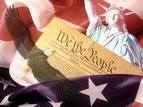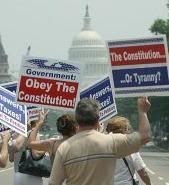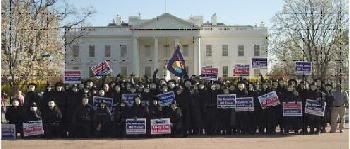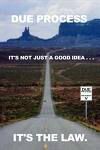Fools Gold
An open letter to all presidential candidates
“There would be no society if there were no exchange and no exchange if there were no money… its efficiency is due not to nature but to law (nomos) and because it is the power of government to regulate it”. Aristotle (Book 5 on Justice)
Due to a deliberate campaign of misinformation, perpetrated by parties of interest, it will be necessary to go over a few fundamentals before tackling the foolishness of the gold standard and the misguided people who advocate it.
In order to explain what an economy is, a simple analogy is paraphrased from “Lawful Money Explained” by Gertrude Coogan. Picture a gigantic vat that contains all of the nation’s production, such as cars, houses, clothes, food, fuel etc., as well as all the services like delivery services, service centers for cars and trucks, dry cleaning, excavating services, hotels restaurants etc. These tangibles are referred to as “goods and services” and are the actual wealth in our economy. Money is not the wealth, but a mere tool for exchanging such wealth. Goods that are used up over time, like factories and railroads are also included. Together all of this makes up the aggregate wealth of our nation… our economy.
Question: How do we obtain the things necessary for ourselves and our families from the vat containing all the essentials for living out our lives, a home, a car, etc.?
Answer: Money a medium of exchange which can be traded for the goods or services that we need to live.
What is money? Money is a debt claim, against available services or goods in our economy. For example, 8 hours of labor by an employee at the deli is traded for corresponding money/debt claims that are equal to the labor required for preparing 50 or 100 sandwiches. The labor traded by the deli worker is sufficient to purchase certain items out of the economy; such as enough fuel to get to work and food to sustain the required energy for making sandwiches. In other words, money is merely evidence that goods or services are owed to the person in possession of it. The holder of money is owed a debt and has legal claim on available goods.
Question: Where does money come from, and where should money come from?
Answer: First, where should money come from? Answer: “Congress shall have the power to coin money, regulate the value thereof; and of foreign coin…” U.S Constitution Article I § 8 part 5 The authority to create money comes exclusively from our Constitution and requires Congressional action. “If Congress has the right under the Constitution (Article I § 8 part 5) to issue paper money, it was given them to be used by themselves, not to be delegated to individuals or to corporations.” Andrew Jackson. Congress shall as the Constitution stipulates coin/create money a right given to government “There would be no society if there were no exchange and no exchange if there were no money… Money (nomisma) by itself is but a mere device. It has value only by law (nomos). The function of money is to measure relationships. We call it “nomisma” because its efficiency is due not to nature but to law (nomos) and because it is the power of government to regulate it”. Aristotle (Book 5 on Justice) Money is coined according to congressional authority and issued into circulation for value received. More on value received in a moment.
Second, where does money come from? Let’s hear it from the Federal Reserve about one of its policies for bringing money into existence: “That’s right – Banks create money.” (Through a process called “fractional banking) “Suppose for example that somebody borrows $90 and pays a bill with it. Whoever receives the 90 payment is likely to deposit it in another bank which can lend $81. Whoever receives the payment will deposit it in another bank, which will lend $72…” Federal Reserve Bank of New York, Public Information Department, 33 Liberty St., New York, NY. This money is debt, and is owed to the bank that created it in the first place, at an interest rate determined by the benevolent banker. There is a particularly stupid myth circulating that the banks do not create money out of nothing, which they admit to in the above. The perpetrator of this myth claims that banks just monetize a borrower’s future income. A real loan would be that the lender foregoes the use of his money, in order to lend it to the borrower. The current method for the banks is to just “abracadabra” it into existence. Now you don’t see it… now you do! People don’t understand what’s going on. Banks charge you 10 or 15% on what they just created!
Abraham Lincoln, during the Civil War issued $150,000,000 into circulation for value received. Lincoln paid the money into circulation in order to buy war materials without paying private bankers for creating what the Constitution already empowered the government to create for themselves (Article I § 8 part 5). Many believe that this is the real reason Lincoln was eventually killed. He was interfering with the money monopoly’s gigantic profits. The international bankers loved the war… it was making them billions.
Credit vs. Value Received
Lincoln issued $150,000,000 from the U.S. Treasury and paid it into circulation, for value received at no interest because the monies paid out by the government are not loans. The money was printed and put into circulation as payment for various goods and services. Our government has no wealth; it depends on the citizens to provide it (from their labor) so it (the government) can then produce roads, bridges, dams, courthouses, post offices, food for the Army, Navy, Air Force and equipment like computers, paper, office furniture, etc., etc. The private money interests were being depriving of huge profits by the exercise of Congress’s authority to create our own money, per Article 1 sec. 8 part 5. The Government’s needs are never-ending. It would continue to put hundreds of millions into circulation weekly in order to satisfy its requirements to operate. Money exchanged for value received is completely different than the loans pumped into circulation by profit motivated, private bankers at the Federal Reserve. Finally, when money is issued into existence for value received and continues to circulate at the barbershops, movie theaters, drug stores, etc., it cannot be canceled out of existence like bank created credit money (Federal Reserve Notes) when a loan is either paid off or called in early (through foreclosures). If the bank lends it, the bank can take it away.
Now that we have a few basics on money creation and credit vs. value received, we can continue on to toward our goal of exposing the ignorance in the thinking that a gold standard is anything but a Fool’s Gold standard.
Gold is a commodity. It is not essential for living. Gold is not money. Gold is like any other substance in that it must be coined/stamped before it actually becomes money. Regardless of substance, paper, tin, or gold, it all has only one purpose: The function of money is to measure relationships. We call it “nomisma” because its efficiency is due not to nature but to law (nomos) and because it is the power of government to regulate it”. Aristotle (Book 5 on Justice) If the U.S. wants to coin gold as money, so be it, but as a standard it will not work properly. Various commodity indexes reflect the cost of living in the U.S… hog bellies, bushels of wheat, corn, cattle, copper, silver, gold, etc. This is where the dollar relationship to commodities is referenced and reported. The dollar’s value is reflected in these indexes. If this Congress wanted to use bottle tops for money it has the authority to do so. If the function of money is to measure relationships, anything the government stamps and designates a numerical value to will suffice: “In the United States neither paper currency nor deposits have value as commodities. Intrinsically, a dollar bills is just a piece of paper, deposits merely book entries.” (Modern Money Mechanics, Federal Reserve Bank of Chicago)
Fools Gold
If gold were made money through a weight to dollar relationship, then money could be removed from our economy through purchases. For example: If a hundred tons of gold was bought by a tycoon and taken to Europe for some personal purpose, our money supply would shrink drastically leaving an insufficient quantity to exchange our goods here in the good old USA. Prices would drop as a result of a smaller amount of gold/money remaining. Unemployment would rise dramatically because employers would not have access to adequate currency from the shrinking supply. Eventually, this would lead to another depression. The thing to remember is that making gold a standard would open the door to manipulation by very wealthy people, international bankers. Again, gold is not wealth its just a commodity of less actual importance for living than hog bellies or corn. The Gold standard is another trick used by the Rothschild’s, Morgan’s, Warburg’s, Rockefeller’s and other behind the scenes people who have the power to purchase huge amounts of gold and control our economy. The biggest trick so far has been the complete control of private money creation through the “Federal Reserve” System. Let’s not fall for another trick.
Ron Paul is my guy. Mr. Paul represents real hope for restoring this republic and the Constitutional principals it is based on. But, The Hon. Paul is wrong on the gold standard. Economist Gertrude Coogan, “Lawful Money Explained”, Nobel Laureate Frederick Soddy, “Wealth and Virtual Wealth”, Former Congressman Charles A Lindbergh Sr., “Banking and Currency and The Money Trust” and other distinguished authors that have ably and simply explained the fallacy behind the “Gold Standard”.
Our Congress sold us out long ago with their passage of the Federal Reserve Act in 1913. The super wealthy have procured sufficient influence in our representative body of government, to maneuver congressional finance committee members for their own personal profit purposes. I think Mr. Paul would agree. If any of you are close to the Hon. Paul, please advise him to investigate this issue. No fools gold for the U.S, citizenry. Let’s shut down the international banking kook cartel and become a sovereign people in control of our finances and future prosperity.
Lastly, by further manipulation of Congress, Lincoln was prevented in his endeavor to issue more constitutional money. They mischievously stipulated that the new issues would not be legal tender for all debts, public and private. This restriction prevented Lincoln’s new purposed money issue from being accepted… in many cases, thwarting the remedy the President sought in order to break our country free from the slavery of privately created credit money (debt). Examples of these types of maneuverings can be found in Andreades’s “History of the bank of England”. Our first Secretary of the Treasury, Alexander Hamilton corresponded with the money interests in England, and stated on April 30, 1781 in a letter to Robert Morris, superintendent of finance for the Continental Congress:
“A national debt, if it is not excessive, will be a national blessing; a powerful cement of union; a necessity for keeping up taxation, and a spur to industry.”
The blessings bestowed by Alexander Hamilton have turned out to be a curse, now lasting for over two hundred years. We need an honest system of money in order to have a society. Let’s not call another curse down on ourselves with the “gold standard”.
Bill Price












3 Comments:
SLAVERY, my dear Mr. Price you may wish to ask yourself a question. What is the collateral for all this "paper credit" that has no value? When you understand this question (and the answer is easy to find) then you will know how bad the idea of the Federal Reserve was. You can not spend like a drunken sailor if you had to "pay" for goods and services. We the United States are in debt up to our eyes, and someday the "creditors" will come knocking. Also study Full Faith and credit, accord and satisfaction.
Paper is more dangerous than one can imagine. it represents "contract obligation" The constitution makes reference to higher law, the first is Gods law. We do not enforce this law but it is there. The next is COMMERCIAL law "No state shall pass any law interfering with the obligation of contracts" Both are superior to the bill of rights and the Constitution. Sir you do not own a single thing and do not know it. In fact you owe a ton and since you have no "dollars" to pay that only leaves your ass....
To: Courtbuster
My dear Mr. CourtBuster, I gave you my sources. Charles A, Lindbergh Sr. “Banking and “Currency and the Money Trust”, Gertrude M. Coogan “Lawful Money Explained” and “Money Creators Nobel Laureate Frederick Soddy “Wealth and Virtual Wealth” A. Andreades “History of the Bank of England” I stand by my sources and their conclusions on the “Gold Standard”. What is the collateral for your words, besides your theories on God, commercial Law and paper and my ass?
I agree the gold standard is not the answer. But, it's better than the feds. And the authority to control money must be returned to the congress where it belongs. Were we the people have the best chance of controlling our money for ourselves.
Post a Comment
Subscribe to Post Comments [Atom]
<< Home